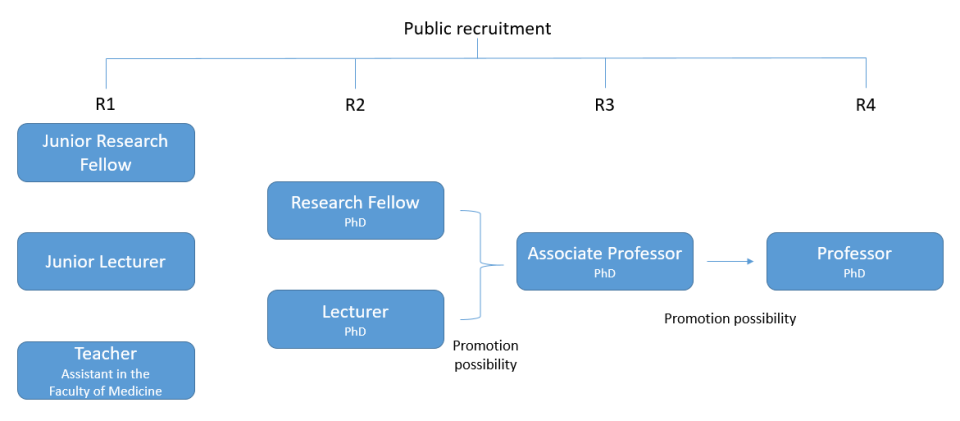Career model for academic staff
Career model of the University of Tartu
The University of Tartu’s new career model took effect on 1 January 2021. The new structure involves seven academic positions: professor, associate professor, research fellow, lecturer, junior research fellow, junior lecturer, and teacher. In the Faculty of Medicine, as an exception, a person in the teacher position may be called an assistant.

Career model
In the first two stages of the career model, the teaching and research paths remain separate, and the two higher stages have a combined path of study and research. A doctoral degree is required from the second stage.
The university proceeds from the R1–R4 framework of career stages used in the European research area:
- R1 (first stage researcher): junior research fellow (doctoral student without a research degree), junior lecturer, teacher;
- R2 (recognised researcher): lecturer, research fellow;
- R3 (established researcher): associate professor;
- R4 (leading researcher): professor.
Promotion
The career model includes the possibility of promotion to a higher position without announcing an open competition. This possibility is open for academic staff of the second or third stage, i.e. research fellows and lecturers can be promoted to the position of associate professors, and associate professors to the position of professors. Employee’s compliance with the promotion requirements is assessed by the evaluation committee during the regular evaluation of academic staff, and the employees must apply for the promotion. Upon the proposal of the head of the structural unit and with the agreement of the employee, the evaluation may take place earlier.
Requirements for promotion are described in the job descriptions of academic staff (annexes 1 and 2). At first, the evaluation committee will assess whether the employee meets the requirements established for their current position. Then, the committee will assess whether the employee meets the promotion requirements, which are the same as applying for the higher position by public recruitment, and finally, whether the employee complies with the faculty-based additional requirements for promotion.
If the evaluation committee has made a decision about compliance with the requirements, there will be secret voting in the structural unit council about promoting the research fellow and lecturer to an associate professor and secret voting in the faculty council about promoting the associate professor to professor. Promotion to the position of associate professor is based on the decision of the faculty council, and promotion to the position of professor is based on the resolution of the senate.
All the positions can still be filled through public recruitment. Candidates will be assessed on the basis of the job description of academic staff and the requirements of the job offer.
Junior research fellows are doctoral students
Only doctoral students of the University of Tartu can hold the position of junior research fellow. Parliament of Estonia is currently proceeding on changing necessary acts to ensure that the majority of doctoral students in universities, R&D institutions, or enterprises have employment contracts that stipulate their research and development activities in the same field as their doctoral dissertation.
Industry sabbatical
The main objective of industry sabbatical is to facilitate intersectoral cooperation by increasing the R&D capacity of Estonian private and public sector institutions. If the mobility of researchers and knowledge from universities to private and public sector institutions is encouraged, both sides gain a better understanding of R&D and the development potential this can bring. Industry sabbatical helps researchers advance and diversify their academic career, gain new experience and skills, establish links with other sectors. As a result, the number of researchers with private and public sector experience in Estonia increases and the knowledge, skills and experience can circulate, helping to strengthen cooperation. By allowing its successful researchers to work in other sectors, the university can serve society and contribute to the development of Estonia as a whole. A national funding scheme "Supporting intersectoral mobility" has been created with the same objective, encouraging Estonian private or public institutions to hire researchers holding a doctoral degree.



